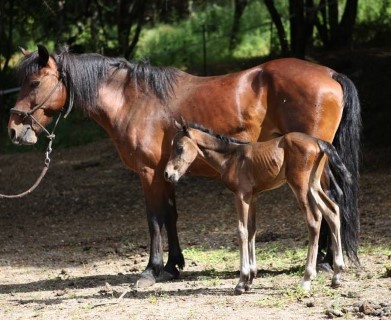Corsican (also known as U Cavallu Corsu or u paganacciu or Cheval corse) horses are small horses indigenous to the Mediterranean island of Corsica, off the coast of south-eastern France.
There are no equines in the fossil record of Corsica, and for that reason it is believed that humans brought the first horses to the island, along with a number of other animals. The Haras Nationaux set up a remount depot on the island in 1861 for the purpose of producing light cavalry horses and mules. When the military ceased to breed horses there, the animals remaining were bred by local people and reverted to a homogeneous phenotype due to what essentially became natural selection.
Corsican horses are small, standing between 1.30 and 1.50 metres (12.3 and 14.3 hands) at the withers and weighing 300 lbs (400 kg). They are found in black, seal brown, or any shade of bay. Their head is relatively short, sometimes heavy, with a straight profile. Their body is compact, with a short and sloping croup. Their legs are fine, with small hard hooves.
Their total population on the island is estimated at approximately 1000. Since the stud-book was established in 2012, about 100 animals have been registered.
